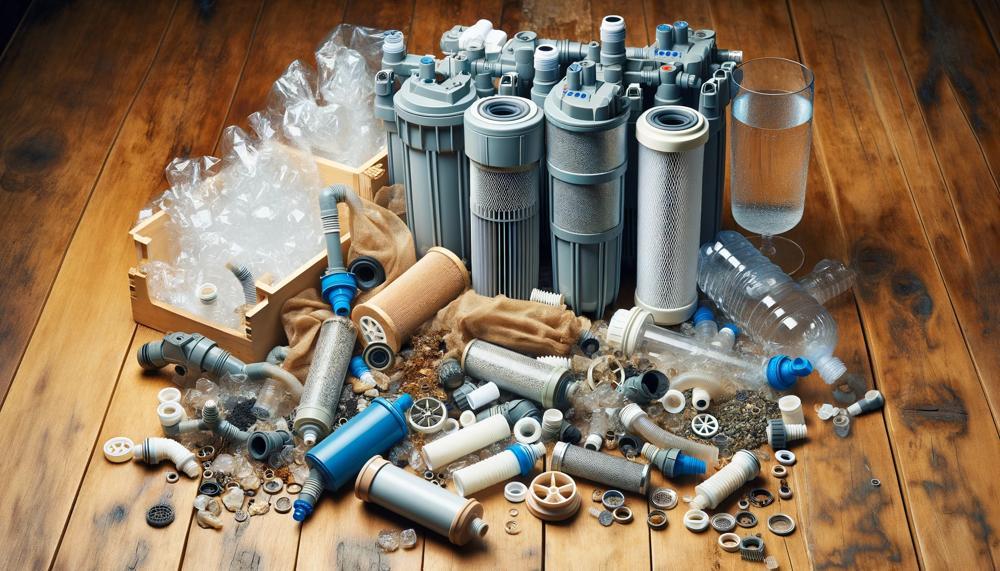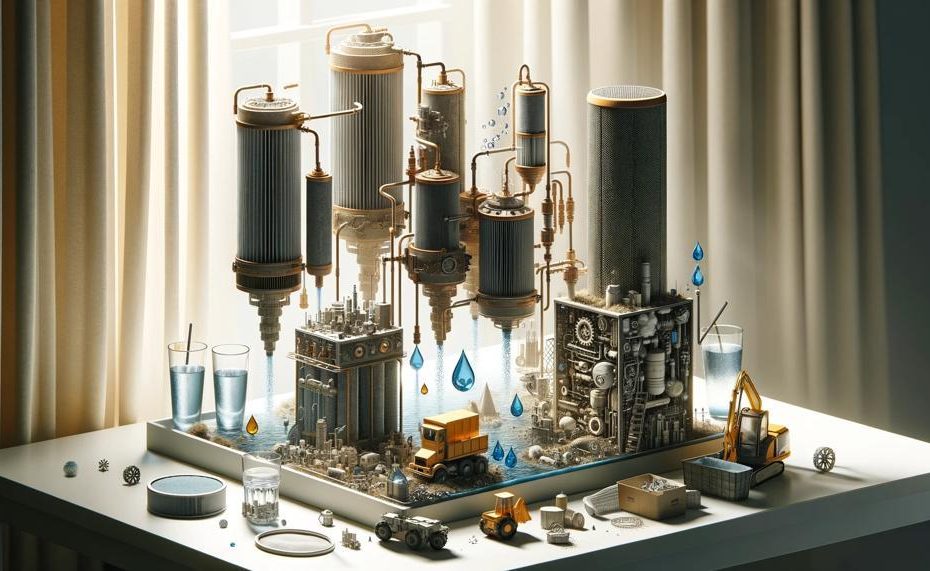Are you standing in your kitchen, staring at a used water filter and wondering what on earth to do with it? You’re not alone. Many of us use filtration systems to ensure our drinking water is clean and safe, but the question of how to dispose of these filters responsibly is a bit of a puzzle. Fear not. This blog post is here to guide you through the maze of proper disposal without bombarding you with jargon or impossible tasks.
In this article, you’ll discover straightforward and responsible ways to dispose of your used water filters, ensuring they don’t just end up in a landfill causing harm to the environment.
So, how to dispose of water filters properly?
Most household water filters can be recycled through the manufacturer or retailer’s recycling programs. The recycling method depends on the filter’s composition. For example, Brita filters are made of polypropylene, while Everpure filters contain aluminum.
Here are some examples of how to recycle different types of water filters:
- Aquasana: Remove the ends of the filters, recycle the plastic parts, and put the carbon in your compost pile or garden.
- Doulton: Remove the plastic thread, break up the ceramic, and toss it into your compost bin.
- Lifestraw: Everything but the capsule can be recycled.
You can also check with your local recycling center to see if they accept water filters.
While not recommended, it is safe to throw water filters in the trash. Many manufacturers may recommend dumping the filter media in the trash before you send the shell of the filter back to them.
Stick around to clear up the confusion around water filter disposal and feel good about the choices you’re making for our planet.
Contents
- 1 How Can You Tell If Your Water Filter Is Too Old?
- 2 Why You Should Recycle You Water Filters
- 3 Can You Recycle Entire Water Filter Pitcher/ Jug?
- 4 How To Recycle EverPure Filters
- 5 How To Recycle Filtrete Water Station
- 6 How To Recycle Mavea Water Filters
- 7 How To Recycle Brita Water Filters
- 8 Can You Recycle Refrigerator Water Filters?
- 9 Conclusion
How Can You Tell If Your Water Filter Is Too Old?
A water filter past its prime is a bit like a languishing teabag; it just won’t steep the impurities out of your water effectively. Here are the pointers to look out for:
Taste and Odor Changes:
If your water suddenly takes on the taste of old pennies or the scent of a damp cellar, it’s a telltale sign that your filter’s days are numbered.
Visible Wear and Tear:
Inspect the filter. If it looks more beaten than an old rug, it’s time to say farewell.
Reduction in Water Flow:
A trickle where there once was a torrent is a silent alarm bell for filter replacement.
Manufacturer’s Timeline:
Check the date you installed the filter against the manufacturer’s advice – if you’re over the date, get to replacing.
Murky Water Quality:
Water should be as clear as a mountain spring. If it’s looking more like a murky pond, your filter needs a swap.
Maintenance and Care:
Consider the care you’ve given your filter. If it’s had a rough ride, it may be time for a new one.
Why You Should Recycle You Water Filters
Recycling water filters is akin to casting a stone into a pond; the ripples of positive impact extend far beyond the initial splash. Here’s why it’s a savvy move:
Environmental Preservation
| Reduces Landfill Waste | Keeps non-biodegradable materials out of landfill sites, mitigating pollution. |
| Conserves Resources | Lessens the need for virgin raw materials, easing the strain on natural resources. |
| Prevents Pollution | Proper disposal ensures harmful substances within filters don’t leech into ecosystems. |
Sustainability Boost
| Minimizes Raw Material Demand | Recycling components means fewer fresh resources are needed for new filters. |
| Supports Circular Economy | Encourages a reuse-and-recycle model, leading to a more sustainable economy. |
Health and Safety
| Ensures Clean Water | Recycled filters can be repurposed to continue providing safe drinking water. |
| Reduces Contaminant Risk | Proper disposal prevents possible chemical seepage into water supplies. |
Recycling is a no-brainer when you’ve got options aplenty, from Brita’s take-back programs to the freebie recycling schemes from TerraCycle and RecycleNation. Not to mention, your local recycling point might just take ’em off your hands. And let’s not forget, even the water softener bits in your filter can go on to live another day in a new guise.
The Crux of the Matter
Chucking used water filters in the bin is old hat. It’s about time we all took a sharp turn towards recycling – it’s a cinch, really. From guarding our splendid planet to ensuring that every drop of H2O we sip is as pure as nature intended, it’s a win-win.
Can You Recycle Entire Water Filter Pitcher/ Jug?
When pondering the recyclability of entire water filter pitchers or jugs, let’s split the matter into clear chunks. Not all parts of a water filter pitcher or jug can be tossed into the recycling bin as one. Here’s the scoop:
| Part of Pitcher/Jug | Recyclable? | How to Recycle |
| Filter Cartridges | Brand Dependent | Use brand’s take-back program or check local recycling options |
| Plastic Jug | Yes, if #1, #2, or #4 plastic | Recycle through local curbside program after removing non-recyclable parts |
| Lids/Handles (varied materials) | Material Dependent | Separate and recycle if possible, according to your local guidelines |
So, can you recycle the entire kit and caboodle? Not exactly. It’s a bit of a jigsaw puzzle – you’ve got to piece apart the recyclable bits from the riffraff.
Cartridges might need to hitch a ride back to their maker, while the jug can usually hit the recycling bin with a bit of prep. Just remember, when in doubt, give your local recycling centre a bell – they’ll set you straight.
How To Recycle EverPure Filters
To recycle EverPure filters effectively and with environmental consideration, follow these steps:
Assess Filter Lifetime
Ascertain if your EverPure filter requires replacement by reviewing its life expectancy, typically between 6 to 12 months, and evaluating the condition of your tap water.
Dismantle the Filter
Gently rotate the top of the filter to separate the plastic components from the filtration material inside.
Local Recycling Policies
Investigate whether your local council permits the recycling of water filter cartridges alongside regular household recyclables.
Utilize EverPure’s Recycling Program
Reach out to EverPure for information on a nearby drop-off point for used cartridges or instructions on how to mail them for recycling.
Explore Alternative Recycling Schemes
Look into other programs, such as those run by Filtrete or Brita, which offer comprehensive recycling options for water filters.
Prepare Filters for Recycling
Before dispatch, ensure that the filters are completely dried to avoid the growth of mould or bacteria during transport.
Consider Sustainable Filtration Options
Ponder over investing in a long-lasting filtration system, like reverse osmosis, which can reduce the frequency of filter replacements, or UV purification systems that do not use traditional filters, thus diminishing waste.
How To Recycle Filtrete Water Station
To properly recycle your Filtrete Water Station, you should heed these steps:
| Step | Action | Notes |
| 1 | Disassemble filter | Separate filter media from casing |
| 2 | Rinse parts | Remove residue |
| 3 | Sort materials | Plastics, metals etc. |
| 4 | Research programs | Manufacturer or TerraCycle |
| 5 | Check local centres | Acceptance of water filters |
| 6 | Package components | Follow instructions |
| 7 | Label package | Mark as recyclable |
| 8 | Send or drop off | Recycling facility/collection point |
By adhering to these steps, you’re not just chucking a filter; you’re protecting our blue planet. Plus, you’re giving materials a second lease of life, keeping them from languishing in landfills. Every bit counts, and your action could ripple through, inspiring others to join in.
How To Recycle Mavea Water Filters
Recycling Mavea water filters involves several key steps to ensure environmental responsibility and compliance with recycling standards.
| Step | Action | Details |
| 1 | Filter Lifespan Check | Assess whether your filter needs replacing based on time or water quality. |
| 2 | Disassemble | Twist and open the filter to separate plastic parts from filtering media. |
| 3 | Recycling Rules | Confirm with your municipality on the recyclability of water filter cartridges. |
| 4 | Manufacturer Outreach | Inquire about Mavea’s own recycling programme for filters. |
| 5 | Alternative Recycling | Look for options like TerraCycle or similar recycling schemes. |
| 6 | Shipping Prep | Dry the filter, package responsibly, and label for shipping. |
| 7 | Eco-friendly Systems | Consider filters with longer lifespans to reduce waste. |
How To Recycle Brita Water Filters
Recycling Brita water filters involves a few precise steps to ensure they are disposed of in an environmentally friendly manner.
| Step | Action | Details |
| Drying | Shake and Air Dry | Minimum of three days to ensure dryness |
| Collecting | Gather Brita Products | Accumulate at least 5 pounds for efficient processing |
| Packaging | Wrap and Box | Use a bag and cardboard box to secure the items |
| Shipping | Send to TerraCycle | Use Brita’s TerraCycle program for free shipping |
| Drop Off | Find Local Options | Check for local retailers or recycling centers |
Remember, tossing Brita filters in the bin is a doddle, but taking the extra step to recycle them keeps our planet a tad bit healthier.
Can You Recycle Refrigerator Water Filters?

Yes, recycling refrigerator water filters is possible. It’s a splendid way to contribute to the environment by reducing landfill waste and responsibly reusing materials. Here’s how you should go about it:
| Step | Action | Benefit |
| Determine Eligibility | Check with the brand or local council for recycling options. | Ensures proper recycling process. |
| Prepare Filter | Dry the filter, as required by many recycling programs. | Prevents mold and facilitates recycling. |
| Package | Follow specific packaging instructions provided by the recycler. | Protects the filter during transportation. |
| Send or Drop Off | Ship the filter back to the manufacturer or take it to a recycling center. | Completes the recycling loop, conserving resources. |
In a nutshell, you can indeed recycle your refrigerator water filters, and it’s a jolly responsible action to take. Be sure to check the specifics with the brand or your local council to ensure you’re following the right procedure.
Conclusion
To sum up, properly disposing of water filters is an important step toward sustainability and environmental preservation. We’ve looked at a few acceptable methods for disposing of old water filters. Some manufacturers provide take-back programs expressly for their goods, and local recycling organizations could accept your filters. Reusing your old filters may give them a new lease of life and keep them out of the trash if you’re feeling crafty. When there is no way to recycle or repurpose your filters, make sure you properly dispose of them in the garbage.
Maintaining the quality of your drinking water and determining when to dispose of it both depend on routinely inspecting your water filter for age indicators. Beyond just being a socially responsible choice, recycling your water filters also helps protect natural resources, promotes a circular economy, and guarantees the purity and safety of our water.
It is important to dismantle and separate materials appropriately when it comes to water filter pitchers and jugs since not all of the parts may be recyclable. You may increase the beneficial effects of these efforts by adhering to the particular recycling standards for companies such as EverPure.
Your decision to recycle or properly dispose of your water filters is a tiny but meaningful step toward a cleaner earth and a sustainable future.





